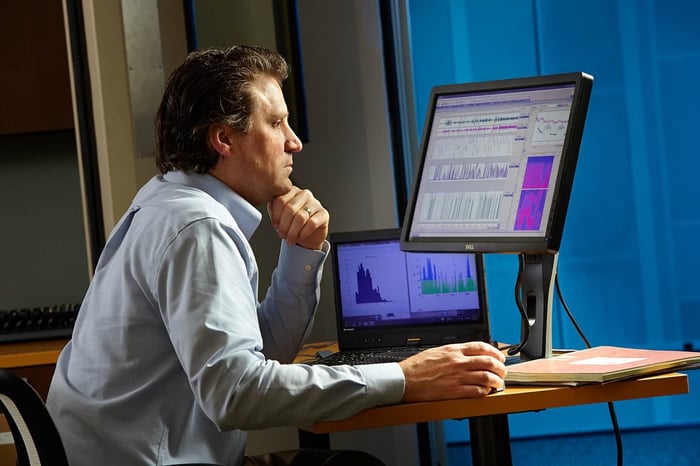Raising a helping hand to teachers who lose their voices

Rooted in interdisciplinary training and a desire to improve ailing voices of teachers, Eric Hunter, associate dean for research in the College of Communication Arts and Sciences and director of the Trifecta Initiative for Interdisciplinary Health Research, has fostered and built teams to conduct important research to support professionals who rely on their voice. Now, he is an empowering figure in the Department of Communicative Sciences and Disorders at MSU, where he has been recognized as an MSU Foundation Professor.
In addition to university administration and teaching, Hunter’s research takes him to the nexus between physical science and the science of communication. He uses a technical approach to study the physics of sound, also referred to as acoustics, applying his findings to speech, hearing and general communication.
For the last 15 years, Hunter has studied occupational voice use, particularly examining voice disorders in elementary and secondary school teachers.
“My parents were both teachers, and I saw how their voice problems impacted them. But another driving force is my fifth grade teacher. She was quite experienced, but we were a very rowdy and unruly class. Well, mid-way through the year, she lost her voice. I didn’t have a sense of why at the time,” said Hunter.
“Now I understand that a common cold or an upper respiratory infection is sometimes all it takes to push teachers, particularly those who have a loud classroom of students, into something that can grow into a real voice disorder. And, without a healthy voice, classroom management and learning are significantly reduced.”
One way to promote voice health in teachers is to use other forms of classroom management. For those whose regularly suffer from voice problems, however, more study is needed to understand why they are prone to issues.
“Schoolteachers’ voice problems are a significant public health issue, not only because these problems occur so frequently but also because they undermine education in the classroom,” Hunter said.
“My current research explores what environmental, physiological or behavioral risk factors contribute to one teacher having more problems than another one. My goal is to ascertain why some teachers are more resilient than others.”
While many voice problems stem from immutable physiological factors like lung size or age, Hunter said that many others may surprisingly come down to modifiable behaviors as simple as water or caffeine intake. Therefore, his research gives teachers practical solutions to reduce their higher risk of voice problems.
“These interests have become more personal over time as I face chronic voice loss,” said Hunter, who speaks with humility and a soft voice. “The questions I explore about schoolteachers are also ones I wonder as I’ve gotten older and work to maintain my own voice and recovery.”
Creating new opportunities for research at MSU
Many of Hunter’s contributions are evident in his leadership and the way he has united researchers across disciplines. In his roles directing research for ComArtSci and Trifecta, Hunter looks for ways to build upon the strengths of a program as a whole, while connecting researchers who bring different types of expertise to the same topic.
“How can we increasingly bring people together from different disciplines who have the same goal?” Hunter said the trick is to encourage interdependence in research activities, while also letting researchers sustain independence in their field. “The specialties and the expertise come from being independent, but the big questions are solved by being interdependent and working together.”
With more than seven years on the faculty at MSU, Hunter has witnessed Spartans Will in action. Whether students, faculty or staff, he said Spartans are always ready to come together in pursuit of a common goal.
“A lot of places say they want to do interdisciplinary work and they try, but this is one of the few places that it’s more ingrained in the nature of the people to find a way to get things done,” said Hunter. “We may not be able to outspend other universities, but we can connect one specialty and another specialty and do something that nobody is doing.”
Hunter sees this commitment in the faculty, but even more so in the university staff, who have carried on a long tradition of collaboration at MSU.
“Nothing is ever universal across every college, but it seems to exist here at ComArtSci at a higher percentage than anywhere I’ve been,” said Hunter. “If there’s something we want to do, we’re going to figure out a way to do it.”
This story was adapted and appears in full on the College of Communication Arts and Sciences website.